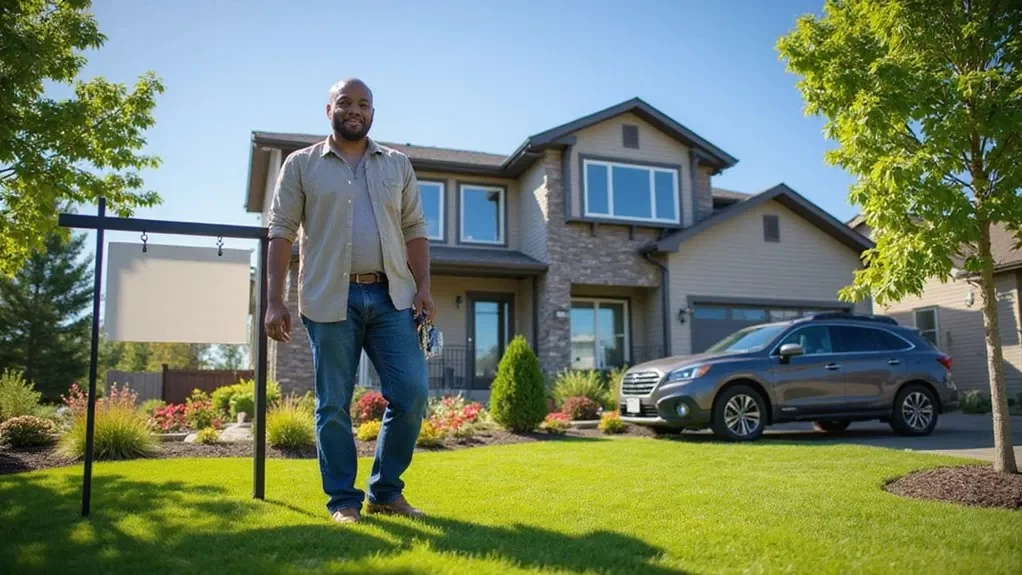Trapped beneath a mountain of mortgage debt, many homeowners feel their selling options slipping away. The remaining loan balance looms large, creating uncertainty about whether selling is even possible. Fortunately, you don’t need to wait until your mortgage is fully paid off to sell your property.
You can absolutely sell your house before paying off the mortgage. The process requires obtaining a payoff statement from your lender and using sale proceeds to clear the remaining balance at closing. Mortgage payoff happens automatically through the closing process, with the escrow company handling the transaction details.
In this guide, I will explore everything you need to know about selling a home with an existing mortgage.
Key Takeaways
- You can sell your house before paying off the mortgage, with the remaining balance settled at closing from sale proceeds.
- An escrow company manages the mortgage payoff process, ensuring the lender receives the owed amount before transferring ownership.
- Obtaining a payoff statement from your lender helps determine the exact amount needed to settle the mortgage during sale.
- If the mortgage exceeds the home’s value (underwater), options include short sales, loan modifications, or waiting for market recovery.
- Cash buyers simplify and accelerate the sale, often allowing a quick, as-is transaction without traditional financing delays.
Can You Sell Your House Before Paying Off the Mortgage?

Yes, you can sell your house before paying off your mortgage. This happens regularly in real estate transactions. The remaining mortgage balance must be paid from your sale proceeds at closing.
Your payoff statement will show the exact amount owed to your lender. You’ll need sufficient equity to cover both the mortgage and closing costs. Otherwise, you might face a shortfall.
The escrow company handles the payment to your lender during the closing process. They also manage the property transfer documentation.
Most homeowners use this approach when upgrading or downsizing their living situations. Your real estate agent can help navigate this common transaction.
What Happens to Your Mortgage When You Sell?

When you sell your home, your mortgage must be paid off at closing using the sale proceeds.
You’ll request a payoff statement from your lender to determine the exact amount needed, which can include principal, interest, and fees.
The escrow company then ensures the lender receives these funds directly, settling your remaining balance before the property transfer occurs.
Mortgage Payoff Process
Your mortgage must be paid in full when you sell your home. This happens before the new owner takes possession.
Request a payoff statement from your lender right away. This document shows the exact amount needed to clear your debt.
The total payoff amount includes your remaining principal, interest, and any applicable fees.
An escrow company handles this financial transaction during closing. They ensure proper payment and documentation of your loan satisfaction.
After completing this process, you’ll receive confirmation that your mortgage obligation is finished.
Role of the Escrow Company
Escrow companies handle the financial aspects of your home sale and ensure proper mortgage payoff. They collect all sale proceeds when the transaction closes.
After receiving the funds, they prepare a detailed settlement statement. This statement includes the exact mortgage payoff amount required by your lender.
The escrow company then sends the payoff funds to your mortgage lender. This typically happens within 24-48 hours after closing.
As a result, your mortgage gets paid off correctly. Furthermore, this process guarantees the buyer receives clear title to the property without any liens or encumbrances.
Remaining Balance Calculations
Your mortgage payoff amount includes outstanding principal, accrued interest, and any applicable fees. Lenders calculate this total when you request a payoff statement. The figure represents your complete obligation to the lender.
This calculation matters during home sales because the exact amount must be paid at closing.
Most lenders require 10-30 days’ notice to prepare an official payoff statement. The escrow company handles this transaction, ensuring funds transfer correctly.
After payment, your lender will release their claim on your property. This process officially transfers ownership to the buyer and satisfies your mortgage debt completely.
Is It Possible to Sell with an Existing Mortgage?

Yes, you can absolutely sell your home while still owing on your mortgage. Most home sales actually involve properties with existing loans.
To sell successfully, first request a payoff statement from your lender. This document shows the exact amount needed to completely satisfy your loan.
Next, ensure your sale price will cover both this payoff amount and all closing costs. Finally, at closing, the proceeds automatically pay off your mortgage balance.
As a result, you’ll walk away debt-free on this property with any remaining equity in your pocket.
What Are the Options for Underwater Mortgages?
If your mortgage is underwater, you have several options to consider. You can pursue a short sale with lender approval, try a loan modification, or offer a deed in lieu of foreclosure.
Waiting for market recovery is another choice, but it comes with risks and significant delays.
Short Sale Possibilities
A short sale allows you to sell your underwater home for less than you owe. Your lender must approve this option before proceeding. You’ll need to prove financial hardship through documentation.
The lender may forgive the remaining debt after the sale completes. Lenders require proof of income, expenses, and a hardship letter to approve short sales.
Moreover, this process helps avoid foreclosure on your credit report. As a result, you can move forward without the burden of an unmanageable mortgage. This knowledge can also help others in similar financial situations.
Loan Modification Programs
Loan modifications change your mortgage terms to make payments more affordable. Lenders can reduce your interest rate, extend your loan term, or lower the principal balance.
You must prove financial hardship through documentation of your income and expenses. Most programs require you to be behind on payments or at risk of default.
These changes help prevent foreclosure and keep you in your home. Lenders often prefer modifications over foreclosure because they lose less money.
The approval process typically takes 30-90 days depending on your situation.
Furthermore, some government-backed programs offer standardized terms for qualifying homeowners. Contact your lender immediately if you struggle with payments.
Deed in Lieu of Foreclosure
A deed in lieu of foreclosure lets you give your property back to the lender instead of going through foreclosure. This option saves time and money for both parties. You must provide financial documents to qualify.
Your mortgage debt mightn’t be completely forgiven after signing over the property.
The lender may still pursue you for remaining balances through a deficiency judgment. Furthermore, this action will affect your credit score.
Before making this decision, talk to a housing counselor or attorney. They can explain all consequences and potential alternatives based on your situation.
Waiting for Market Recovery
Market recovery is a viable option when your home’s value falls below your mortgage balance. This strategy preserves potential equity while avoiding a loss.
You can generate income by renting your property during this waiting period. Consider your financial stability before choosing this path. Housing markets typically recover over 2-5 years in most regions.
Short sales or loan modifications offer alternatives if waiting isn’t feasible. Your local market conditions should influence your decision. Professional advice from a real estate agent can help determine recovery timeline estimates.
How to Sell Your House With a Mortgage?
To sell your house with a mortgage, start by determining your home’s current value and obtaining a payoff statement from your lender.
Next, prepare your home for sale and coordinate with real estate professionals to list it effectively.
Finally, handle the closing process carefully to ensure the mortgage is paid off with the sale proceeds and the title transfers smoothly.
Determining Your Home’s Current Value
Your home’s current value can be calculated in three main ways. First, compare recent sales and active listings in your area through a Comparative Market Analysis (CMA).
Second, hire a professional appraiser who’ll provide an unbiased assessment based on industry standards.
Third, automated valuation models (AVMs) offer a quick estimate that you can adjust for your property’s unique features.
With this information, you can realistically estimate your potential sale proceeds.
A home valued at $300,000 with a $200,000 mortgage would yield approximately $100,000 before closing costs.
This knowledge prevents pricing mistakes and helps set fair expectations for your sale.
Calculating Your Mortgage Payoff Amount
To calculate your mortgage payoff amount, request an official payoff statement from your lender. This statement shows the exact amount needed to completely settle your mortgage. It includes your remaining principal, accrued interest through the payoff date, and any applicable fees.
Lenders typically add a small buffer of additional interest days to ensure complete payment.
The payoff amount differs from your current balance shown on monthly statements. Having this precise figure helps you understand your potential profit from selling your home. You can then plan your finances accordingly and avoid surprises at closing.
Preparing Your Home for Sale
Boost your home’s selling potential with targeted preparations. Fix any obvious damage first – leaky faucets, cracked tiles, or peeling paint require immediate attention. These repairs often deliver the best return on investment.
Next, declutter all living spaces by removing personal items and excess furniture. A clean, neutral environment helps buyers envision themselves in the space. Consider professional staging if your budget allows.
First impressions matter tremendously. Invest at least 1-2% of your asking price on exterior improvements. Fresh mulch, trimmed shrubs, and power-washed surfaces can dramatically increase buyer interest. Additionally, ensure all outdoor lighting works properly.
Polish everything until it shines. Clean windows let in more light, making rooms appear larger and more inviting. Furthermore, address any lingering odors from pets, cooking, or smoking.
Working with Real Estate Professionals
Real estate professionals make home selling easier when you still have a mortgage. They provide expert market knowledge and help determine the right price for your home. These professionals handle property marketing and connect buyers with your listing through multiple channels.
A good agent manages negotiations between you and potential buyers. They guide you through the paperwork and closing process with minimal stress. Most importantly, they ensure your mortgage payoff happens correctly during the ownership transfer.
Additionally, real estate agents maintain networks of reliable service providers for inspections or repairs.
State laws require specific disclosures and documentation when selling a home with an existing mortgage. Their expertise helps avoid costly mistakes throughout the transaction.
Handling the Closing Process
The closing agent manages your mortgage payoff using sale proceeds. You must prepare three items in advance. First, request a current payoff statement from your mortgage lender.
Second, carefully examine the settlement statement to verify accurate mortgage payoff amounts and closing costs.
Third, ensure all property liens are properly settled before transferring ownership.
These steps create a clear title transfer. Proper preparation prevents unexpected issues at closing.
The closing agent coordinates with all parties to ensure funds flow correctly. Your diligence protects your interests throughout this final transaction stage.
What Costs Should You Anticipate When Selling?
When selling your home, you should expect to cover the remaining mortgage balance, which the escrow company will pay off at closing.
Additionally, you’ll need to pay real estate agent commissions, closing costs, and fees that can add up to several percent of the sale price.
Don’t forget to check if your loan has any prepayment penalties that could increase your expenses.
Remaining Mortgage Balance
Your mortgage balance is the amount you still owe on your home loan when selling. Contact your lender for a payoff statement showing the exact amount. This balance must be paid from your sale proceeds during closing.
Some lenders charge prepayment penalties if you pay off your loan early. These fees can range from a few hundred to several thousand dollars. Always verify if these apply to your loan.
Accurate payoff information prevents closing delays and helps you calculate your potential profit.
The final payoff amount may include interest through the closing date and any related fees.
Real Estate Agent Commissions
Agent commissions cost 5-6% of your home’s selling price. These fees are divided equally between your agent and the buyer’s agent.
The commission on a $200,000 home ranges from $10,000 at 5% to $12,000 at 6%. Your share as a seller would be half that amount.
Flat fee options offer an alternative to percentage-based commissions. The actual cost varies based on service level and market. Additional fees may apply depending on your agreement.
Consider these expenses when calculating your final proceeds from the sale. The right commission structure depends on your specific needs and selling situation.
Closing Costs and Fees
Sellers pay 2% to 5% of the home’s sale price in closing costs at settlement. Real estate agent commissions range from 5% to 6% of the final sale price. You’ll also need to cover transfer taxes and attorney fees in most states.
Additional expenses may include inspection repairs, title insurance, and escrow fees.
These costs directly reduce your profit from the sale. However, some fees are negotiable with your agent or the buyer.
Understanding these expenses helps you calculate your net proceeds accurately.
Many sellers forget to account for these costs when planning their next home purchase.
Potential Prepayment Penalties
Prepayment penalties are fees charged when you pay off your mortgage early. These penalties typically range from 2-5% of your remaining mortgage balance.
Your lender may also include a yield maintenance fee to recover lost interest. Before selling your home, request a payoff statement from your lender to determine if penalties apply.
These costs directly reduce your sale proceeds. For example, a 3% penalty on a $300,000 balance equals $9,000 less in your pocket.
Furthermore, some loans have decreasing penalties that phase out over time.
Can Selling to a Cash Buyer Simplify the Process?
Selling to a cash buyer can speed up your sale by cutting out financing delays and reducing contingencies.
You’ll typically close in 7 to 14 days, saving time compared to traditional sales. Plus, fewer hurdles mean a simpler mortgage payoff process and lower selling costs.
Faster Closing Timeline
Cash buyers close homes in 7-14 days instead of the typical 30-45 days with traditional buyers. Without mortgage approvals, the process becomes streamlined and direct.
Most cash sales complete within one week when paperwork is prepared properly.
This speed helps homeowners who need to move quickly or settle debts fast. You’ll face fewer hurdles since cash transactions eliminate lender requirements and financing contingencies.
Furthermore, you can skip repairs in many cases, selling your home as-is. As a result, the entire transaction requires less paperwork and fewer parties involved.
Fewer Contingencies
Cash buyers require fewer conditions to complete your home sale. Traditional sales often include mortgage approvals that can delay or derail transactions. Without these hurdles, you face less risk of deals falling through. Your interests remain protected throughout a simpler process.
The absence of financing contingencies eliminates waiting for lender approvals.
Most cash transactions close within 1-2 weeks compared to 30-45 days with traditional buyers. As a result, you can move forward with your plans sooner.
In addition, fewer contingencies mean reduced paperwork and legal complexities.
Reduced Selling Costs
Cash buyers help you save money when selling your home. You’ll avoid lender fees, appraisal costs, and repair expenses that traditional sales require.
No financing fees means fewer closing costs overall. Your sale can complete in just 7-14 days instead of months. The absence of mortgage contingencies prevents common delays. As a result, you receive your money faster and with less paperwork.
Furthermore, you typically sell your property as-is, eliminating costly pre-sale improvements.
This approach works especially well for homeowners needing a quick, hassle-free transaction.
Simplified Mortgage Payoff Process
Cash buyers help you pay off your mortgage faster. You can use sale proceeds directly toward your home loan, which speeds up the entire process. This approach eliminates delays from lender approvals and financing contingencies.
The streamlined process also reduces closing costs. Your mortgage satisfaction typically occurs within days rather than weeks.
Additionally, fewer steps mean less paperwork and fewer opportunities for complications.
As a result, you experience a smoother transition from homeowner with debt to debt-free seller. The simplified payoff creates peace of mind during what can be a stressful life change.
Ready to Sell Your Mortgaged Home in Kentucky? Contact OC Real Estate Today
OC Real Estate can help you sell your mortgaged home in Kentucky. We guide you through the entire process with expertise and care.
First, you’ll need to request a payoff statement from your lender. This document shows the exact amount needed to clear your mortgage at closing. An escrow company will then handle the mortgage release paperwork.
All costs must be settled before ownership transfers, including your mortgage balance and closing fees. This protects both you and the buyer from future complications. Furthermore, our team prioritizes your financial interests throughout the transaction.
Frequently Asked Questions
What Happens if You Sell a House Before Paying off the Mortgage?
Envision your home’s sale as a relay race, passing the baton of mortgage payoff. You must settle the loan at closing with sale proceeds, ensuring the lender’s demands are met, so the property can smoothly change hands.
What Is the 2% Rule for Mortgage Payoff?
The 2% rule suggests you should aim to pay off your mortgage if the payoff amount is less than or equal to 2% of your home’s value, helping you avoid significant financial burdens when selling. Consider your costs carefully.
What Does Suze Orman Say About Paying off Your Mortgage Early?
Suze Orman advises you to prioritize paying off high-interest debts and building an emergency fund before focusing on paying off your mortgage early. She encourages you to analyze your financial goals to serve others effectively with your resources.
What Does Dave Ramsey Say About Selling Your House to Pay off Debt?
You should sell your house if it helps eliminate high-interest debt, frees up cash for other priorities, and aligns with your financial goals. Use the proceeds wisely to serve others and build a stronger, debt-free future.

